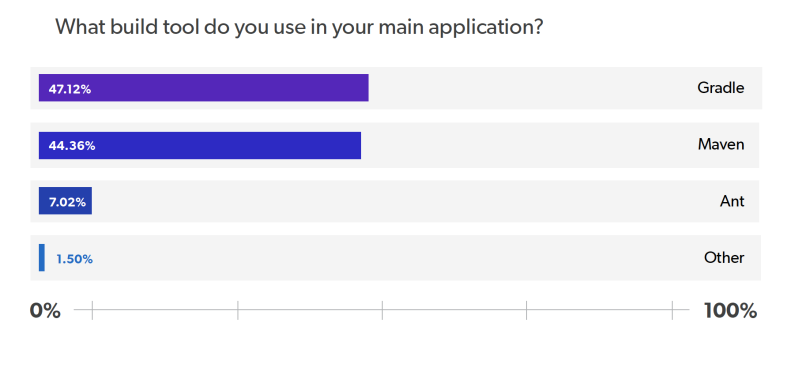| Where's Java Going In 2020 |
| Written by Nikos Vaggalis | |||
| Monday, 24 February 2020 | |||
|
In this third and last part of the saga examining Java's ecosystem in which we try to decipher its direction, we look at Build tools, the popularity of other languages on the JVM and conclude with career tips for all aspiring Java rock-star developers! The findings come from three surveys: Snyk's "JVM Ecosystem Report 2020" with over 2000 respondents, Baeldung's The State of Java in 2019 with over 6,700 both of which we've considered previously, and the JRebel 2020 Java Technology Report which is the latest to provide us with data, from 400 respondents. With regard to developers choice of build tools, the JRebel survey found a fairly even split between Maven (44%) and Gradle (47%):
This was quite different from other two surveys in while Maven was far more popular. According to Snyk Maven's share was 64% compared to Gradle's 25%. Even more pronounced Baeldung reported Maven 75% to Gradle 20%. Jrebel notes: Perhaps reflecting the amount of respondents working in mobile development, Gradle was the more popular of the two. We don’t think that this reflects the reality of Maven vs Gradle adoption — but it’s interesting to see, regardless. In traditional Java applications,Maven is still king,while on mobile and Android Gradle seems to be preferred, probably because Google advertises it more. Another respect in which the JRebel survey differs from the other two is the popularity of Kotlin. In fact all three surveys have Kotlin as the second most popular JVM language after Java itself. It is just the size of Kotlin's share that differs. It is biggest in the Baeldung survey which reports an increase year-on-year for Kotlin use from13% to 16.5%. For Snyk the corresponding figures for Kotlin's share were from 2.4% to 5.5%. JRebel found that 2.5% of its respondents claimed Kotlin as their primary programming language which is all the more surprising given the predominance of Android developers in its survey. In Conclusion The grand summary after collecting the results from all three surveys, is that Java is here to stay.Version 8 is still a long way from deprecation, Kotlin is on the rise trying to break away of the confinements of the Android label and Intellij is well worth the price of admission.Spring still rules without anyone challenging its supremacy, while Maven still rules but is challenged by Gradle. As far as the rest of the ecosystem goes, I'll reiterate the findings of How is Java doing? : But although people still stick to the language and its surrounding ecosystem, they also try to stay away from Oracle and its offerings. Most Java users are looking for more lightweight, efficient, cheaper, developer and license friendly equivalents that are at par or even better than those of Oracle's. Let's look at what the surveys tell us.According to them, do people prefer Oracle's solutions or not? The conclusions from summing up all three of them at your disposal:
In the end,I think that cumulatively the surveys pave a great road map to becoming a prolific Java developer:
More InformationJRebel 2020 Java Technology Report Snyk JVM Ecosystem Report 2020 Baeldung The State of Java in 2019 Related ArticlesThe True State of Java and its Ecosystem To be informed about new articles on I Programmer, sign up for our weekly newsletter, subscribe to the RSS feed and follow us on Twitter, Facebook or Linkedin.
Comments
or email your comment to: comments@i-programmer.info <ASIN:1871962536> <ASIN:1871962544>
|
|||
| Last Updated ( Tuesday, 13 July 2021 ) |



